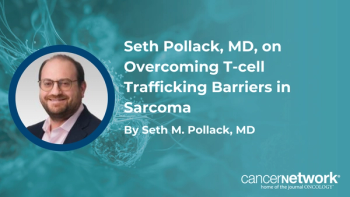
Oncology NEWS International
- Oncology NEWS International Vol 17 No 9
- Volume 17
- Issue 9
COG study sets out max MGd dose for pontine glioma radiotherapy
Preliminary data from a Children’s Oncology Group (COG) study has calculated the maximum tolerated dose of motexafin gadolinium (MGd) for radiation therapy for pontine glioma.
Preliminary data from a Children’s Oncology Group (COG) study has calculated the maximum tolerated dose of motexafin gadolinium (MGd) for radiation therapy for pontine glioma.
Kristin A. Bradley, MD, from the University of Wisconsin School of Medicine and Public Health, and her colleagues set out to determine the dose-limiting toxicities, maximum tolerated dose, pharmacokinetics, and intratumor and brain distribution of MGd with involved field radiation therapy in children with newly diagnosed intrinsic pontine gliomas.
For this research, 46 children received MGd at doses of 1.7 to 9.2 mg/kg daily prior to radiation therapy for 6 weeks. MGd was administered as a 5-minute intravenous bolus 2 to 5 hours prior to standard radiation. The starting dose was 1.7 mg/kg. After first establishing that five doses for 6 weeks was tolerable, the dose of MGd was escalated until dose-limiting toxicity was reached.
Radiation therapy was administered to 54 Gy in 30 once-daily fractions. The maximum tolerated dose was 4.4 mg/kg.
According to the phase I/II results, the authors found the maximum tolerated dose of MGd, and the recommended dose, was 4.4 mg/kg when administered as a daily intravenous bolus in conjunction with 6 weeks of involved field radiation therapy.
The primary dose-limiting toxicities were grade 3 and 4 hypertension and elevations in serum transaminases. Median elimination half-life and clearance values were 6.6 hours and 25.4 ml/kg/h, respectively. The estimated median survival was 313 days (95% confidence interval, 248-389 days).
The results were published in the online edition of the journal Neuro-oncology (August 20, 2008). Dr. Bradley’s COG co-authors are from the University of Pittsburgh, Mayo Clinic in Rochester, Children’s Hospital of Philadelphia, Children’s National Medical Center in Washington DC, Texas Children’s Cancer Center at Baylor College of Medicine, the National Cancer Institute’s Investigative Drug Branch in Bethesda, Maryland, and the Keck School of Medicine of the University of Southern California.
Articles in this issue
over 17 years ago
Japanese team discovers more cancer falloutover 17 years ago
Panel pans FDG-PET for new Medicare oncology coverageover 17 years ago
Sen. Kennedy's brain tumor puts spotlight on new treatmentover 17 years ago
Precise resection in colon cancer may boost survivalover 17 years ago
Payer’s budget to get right targeted drug to right patientover 17 years ago
PET brings treatment changes in majority of colon ca casesover 17 years ago
High death rate brings prostate ca vaccine trial to a haltover 17 years ago
Radiofrequency ablation eliminates nondysplastic BEover 17 years ago
Childhood cancer research gets $30 million from fedsNewsletter
Stay up to date on recent advances in the multidisciplinary approach to cancer.





































